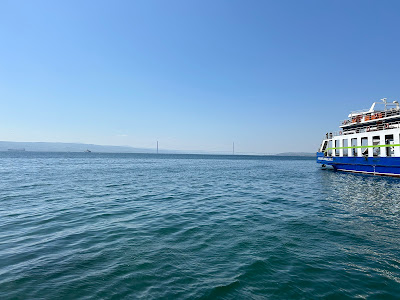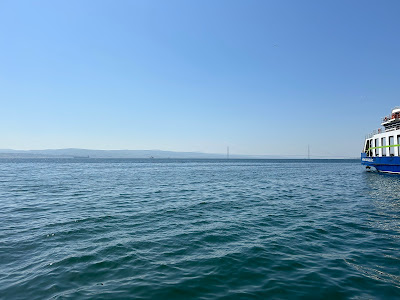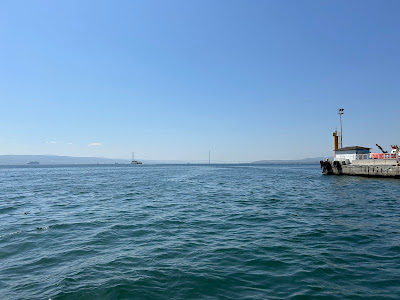The Dardenelles is a 38 mile/61 kilometer long passage which separates the continent of Europe from the continent of Asia. It varies between 0.75 to 3.73 miles/1.2 to 6 km wide. The Greeks and Romans knew it as Hellespontes, or Sea of Helle (from the Ancient Greeks' story of the golden fleece, when the sister of the brother and sister duo that rode the flying golden ram fell off into the ocean. In a somewhat uncommonly happy ending, she ended up becoming a sea princess and marrying Poseidon).
In Turkish it is called Çannakale Boğazi, or Straits of Çannakale (that being our planned destination for the evening).
The English name "Dardenelles" is taken from the time when two forts - the Dardanelles- stood on either side of the strait guarding it, thus controlling access (not dis-similar to the two forts on either side of the narrowest point of the Gulf of Corinth when we were in Greece). The forts were named after an ancient city Dardan, which in turn pulled its name from the ancient Greek (probably mythical) Dardanus, a son of Zeus.
Beyond just service by ferry (in the foreground) the straits are now served by the 1915 Çannakale Bridge (since 2022).
The European side has a city, Gelibolu, which has the same name as the whole peninsula. We know it, anglicized in a slightly different form, as Gallipoli.
What do you do when you are by the sea? Have fresh fish for lunch, of course!
Efes beer (pictured below) appears to be the "national beer" of Turkey.
Crossing the Bridge. Welcome to Asia!








Looks like a pleasant and relaxing day. I'm guessing the temperature and humidity were comfortable?
ReplyDeleteI've been listening to an audiobook entitled Across Asia on a Bicycle. It's the account of two American college students, who in 1890, made a trip around the world on the newly invented bicycle. Turkey is one of the countries they traveled through. It's interesting to pair their experiences with yours.
Leigh, we had surprisingly sunny and warm weather (as told to us by our guide and others) for this time of year. I forgot that essentially Istanbul was a coastal city, as will be the next day or so of our journey. The humidity was not bad, but temperatures definitely warmed up as we worked our way into the heart of Anatolia.
DeleteWhat an interesting book that sounds like, especially for the view of so many cultures and states that have now vanished. Those sorts of things fascinate me now because even today I live in a time when culture and countries are passing away before my eyes. I wonder if future generations will view such works written now with equal interest.
You had some sunny weather over there TB, fresh fish looks good, how was the beer?
ReplyDeleteNylon12, my understanding is that it was unusually sunny and a bit warm for this time of year - which worked to our advantage, although it did giving an interesting insight in what life would have been like in days of yore without climate control (the insight, of course, being the inner plateau of Anatolia is hot).
DeleteThe beer was a lager. Okay, but nothing terribly memorable.
Fish, rice and vegetables... what more could one ask for... besides a few French fries!
ReplyDeleteFrench Fries. Somehow the single most used word involving "French" in cuisine. I am sure the French resent this is likely what they will be remembered for hundreds of years now.
Delete